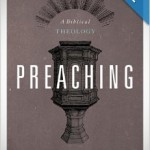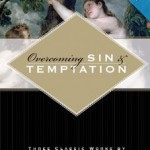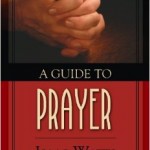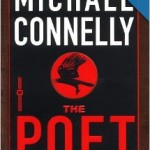I love to read. By God’s grace I am a pretty fast reader; I usually read a couple books each week. I find it helpful to summarize my thoughts on each book and I offer those thoughts in hopes that you will be encouraged to either read or pass over the given title.
 Preaching: A Biblical Theology by Jason Meyer. Many contemporary books on preaching can be quite selective, as some narrowly rely on word studies of “preaching” words, while others largely neglect the Old Testament. Jason Meyer believes his new book fills a void, for he writes, “This book is unique in that I think the whole Bible alone can give a holistic answer to what preaching is” (14). I would affirm the book’s uniqueness. He defines preaching as “stewarding and heralding God’s word in such a way that people encounter God through his word.” Men who preach in this way will be men who preach faithfully, fearlessly, and reverently. I originally planned to do an extended review of the book, but I found myself having nothing to offer but effusive praise. So if you preach regularly or hope to preach regularly, tolle lege!
Preaching: A Biblical Theology by Jason Meyer. Many contemporary books on preaching can be quite selective, as some narrowly rely on word studies of “preaching” words, while others largely neglect the Old Testament. Jason Meyer believes his new book fills a void, for he writes, “This book is unique in that I think the whole Bible alone can give a holistic answer to what preaching is” (14). I would affirm the book’s uniqueness. He defines preaching as “stewarding and heralding God’s word in such a way that people encounter God through his word.” Men who preach in this way will be men who preach faithfully, fearlessly, and reverently. I originally planned to do an extended review of the book, but I found myself having nothing to offer but effusive praise. So if you preach regularly or hope to preach regularly, tolle lege!
 Of Temptation by John Owen. Few books have impacted my view of the Christian life with such simplicity and clarity as this one. It is short, relatively easy (at least for an Owen book), and packs a punch. Owen takes the words of Christ in Matthew 26:41 – “Watch and pray, that ye enter not into temptation” – and offers a two-part scheme for resisting temptation, “Watch and pray.” Housing all kinds of pithiness and profundity that one can expect from the Prince of Puritans, this book might just be the handiest guide to slaying temptation you can find outside of sacred Scripture. Chapter seven’s discussion of heart-watchfulness is particularly helpful.
Of Temptation by John Owen. Few books have impacted my view of the Christian life with such simplicity and clarity as this one. It is short, relatively easy (at least for an Owen book), and packs a punch. Owen takes the words of Christ in Matthew 26:41 – “Watch and pray, that ye enter not into temptation” – and offers a two-part scheme for resisting temptation, “Watch and pray.” Housing all kinds of pithiness and profundity that one can expect from the Prince of Puritans, this book might just be the handiest guide to slaying temptation you can find outside of sacred Scripture. Chapter seven’s discussion of heart-watchfulness is particularly helpful.
 A Guide to Prayer by Isaac Watts. Many know Watts as a hymn writer (“When I Survey,” “Joy to the World,” etc.), but he was also a great theologian and logician. This book on prayer is a treasure trove of wise application on how to pray in light of Scripture. While the book is somewhat short, Watts leaves no stone unturned as he manages to provide enough principles and directions to fill an encyclopedia. One of the most lasting takeaways from the book – for me – will be the relationship between prayer and spiritual conversation throughout the day. Watts writes, “The reason we lack words for prayer is because we speak so little of Christ throughout the day.” A great book on that most difficult of devotions.
A Guide to Prayer by Isaac Watts. Many know Watts as a hymn writer (“When I Survey,” “Joy to the World,” etc.), but he was also a great theologian and logician. This book on prayer is a treasure trove of wise application on how to pray in light of Scripture. While the book is somewhat short, Watts leaves no stone unturned as he manages to provide enough principles and directions to fill an encyclopedia. One of the most lasting takeaways from the book – for me – will be the relationship between prayer and spiritual conversation throughout the day. Watts writes, “The reason we lack words for prayer is because we speak so little of Christ throughout the day.” A great book on that most difficult of devotions.
 The Poet by Michael Connelly. This was the first Connelly book I’ve read that didn’t focus on Harry Bosch or Mickey Haller, and Connelly shines as usual. The Poet follows crime-beat reporter Jack McEvoy as he responds to his brother’s apparent suicide in the only way he knows how: investigative journalism. McEvoy’s investigation uncovers a serial killer of unprecedented cunning who target homicide cops, each one haunted by a case he could never crack. About a third of the way into the book I thought I had identified the killer and was well on my way to accusing Connelly of being predictable, but shame on me! In typical Connelly fashion the books ends with a surprise twist; thus the only thing predictable about his books seems to be their very unpredictability. The Poet was originally published in 1997, thus the reader gets an idea for what journalism was like before internet dominance. For example, one character is amazed that one picture can be downloaded on the internet in just four minutes. This of course comes after a detective’s amazement at the strange device called a “digital camera.” A fun and gripping read.
The Poet by Michael Connelly. This was the first Connelly book I’ve read that didn’t focus on Harry Bosch or Mickey Haller, and Connelly shines as usual. The Poet follows crime-beat reporter Jack McEvoy as he responds to his brother’s apparent suicide in the only way he knows how: investigative journalism. McEvoy’s investigation uncovers a serial killer of unprecedented cunning who target homicide cops, each one haunted by a case he could never crack. About a third of the way into the book I thought I had identified the killer and was well on my way to accusing Connelly of being predictable, but shame on me! In typical Connelly fashion the books ends with a surprise twist; thus the only thing predictable about his books seems to be their very unpredictability. The Poet was originally published in 1997, thus the reader gets an idea for what journalism was like before internet dominance. For example, one character is amazed that one picture can be downloaded on the internet in just four minutes. This of course comes after a detective’s amazement at the strange device called a “digital camera.” A fun and gripping read.
 The Scarecrow by Michael Connelly. This is the second Jack McEvoy book, but Connelly published it twelve years after The Poet. By reading the two volumes back to back I got a clear sense at how technology and the internet revolutionized journalism in just over a decade. Whereas the first volume revels in the novelty of dial-up connections and digital cameras, this second book is stocked with server farms, complex computer hacking, and cutting edge security software. The Scarecrow finds McEvoy forced out of the Los Angeles Times due to budget cuts (thanks to the rise of internet journalism) and once again stumbling into the discovery of a notorious infidel. Page-turning suspense at its finest.
The Scarecrow by Michael Connelly. This is the second Jack McEvoy book, but Connelly published it twelve years after The Poet. By reading the two volumes back to back I got a clear sense at how technology and the internet revolutionized journalism in just over a decade. Whereas the first volume revels in the novelty of dial-up connections and digital cameras, this second book is stocked with server farms, complex computer hacking, and cutting edge security software. The Scarecrow finds McEvoy forced out of the Los Angeles Times due to budget cuts (thanks to the rise of internet journalism) and once again stumbling into the discovery of a notorious infidel. Page-turning suspense at its finest.
